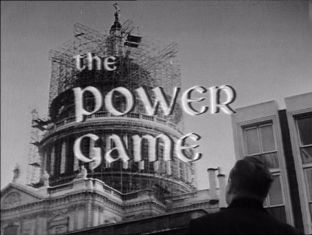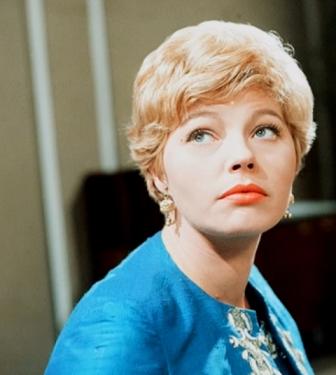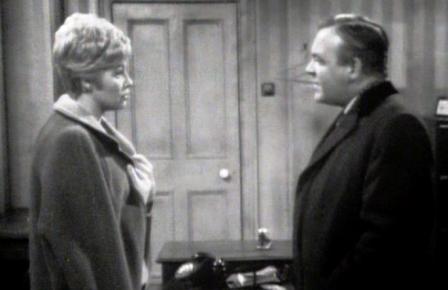
20 December 1965
Lady for a Knight. Writer Raymond Bowers. Director John Nelson Burton
“Name boards are for the obscure – do you have one?” Don Henderson to Ken Bligh
Don Henderson arrives at Bligh Construction as Personal Assistant to Sir John Wilder, and a new battle looms. Sir John Wilder (now knighted following his retirement from the aviation industry) and Caswell Bligh are both members of the National Export Board, a Government sponsored body tasked with promoting exports. The board is made up of three economists, three trade unionists and three industrialists. With Bligh and Wilder now representing both the same industry and the same company, the press speculates which will have to leave the NEB.

The episode opens with a film sequence of Jack Watling as Don Henderson, steering his open-topped sports car through the streets of London, past St Paul’s Cathedral and up to the modern offices of Bligh Construction as big band music blares in the background.
After Edmund Ward’s explosive transition from the world of “The Plane Makers” to “The Power Game”, Raymond Bowers is given the task of bringing together the pieces of the new format. John Wilder is now Joint Managing Director of Bligh Construction. He has brought in Kay Lingard (Norma Ronald), his secretary from Scott Furlong and has appointed Don Henderson as his personal assistant, with his first task being to carry out background research that will further Wilder’s plans.
Wilder intends to turn Bligh Construction into an international force, bidding for construction projects around the world. For that he needs to keep his seat on the National Export Board.

Bowers introduces Susan Weldon (Rosemary Leach), a Higher Executive Officer in the Civil Service who is deputy secretary to the secretary of the National Export Board. As Henderson tells Wilder, she is also secretary to the Civil Engineering Committee which means that she has “more information regarding exports than anybody…including the Chancellor of Exchequer.”
Leach plays Weldon as quietly defiant when Wilder tries to get his own way at the National Export Board, innocently and calmly explaining why she can’t agree to his orders. Yet despite some quite aggressive behaviour from Wilder, director John Nelson Burton leaves us in no doubt as to the effect he’s had on her, as we see her tugging at the top button of her suit jacket. Wilder’s seduction of Weldon is as outrageous in its own way as Michael Caine’s seduction of his landlady in “Get Carter”.
Pamela Wilder is shown as omnisciently resigned to events. Even before Wilder has met the newly appointed Susan Weldon, his wife has phoned the National Export Board to try and get hold of him and after chatting to Susan for a couple of minutes, pointedly asks for her name as if she already knows what will happen (perhaps she’s seen the title sequence and knows that Weldon is going to feature significantly).
The contrast between private and public sector is clearly illustrated by designer Peter Roden. Whereas Bligh Construction is headquartered in bright, spacious offices with modern art on the walls, and Pamela Wilder is shown phoning from an elegant chinese-themed drawing room, Susan Weldon is huddled in her coat over a sputtering electric bar heater, a view of Victorian rooftops out of her window and faded imperial wallpaper creating the subtle image of prison bars. This office is scene of the first confrontation between Susan and Wilder. Arguing over the procedure for holding an NEB meeting, Weldon says it can only be chaired by the Chairman or Secretary (Townley). Wilder says there is nothing to say another member cannot chair the meeting. “It’s implicit”,Susan replies. “THAT, is a matter of opinion,” Wilder retorts,”What is NOT, is that it’s NOT EXPLICIT!”
Another of Bower’s tasks is to define the conflict between Wilder and Caswell Bligh. In the previous episode, Bligh was opposed to Wilder as an interloper. Now we learn that Bligh has political ambitions, seeing a role for himself as some kind of Minister for Motorways. Therefore, his seats on both the National Motorway Council and the National Export Board are vital as stepping stones. When the press begins to ask whether Wilder or Bligh will leave the NEB, Bligh is in no mood to stand aside.

Assistant Under Secretary Colin Townley, the career civil servant in charge of the National Export Board, is played by James Maxwell, who was strongly involved with Casper Wrede, Richard Negri and Michael Elliott at the 59 Theatre Company. Maxwell performed opposite Patrick Wymark and translated “Danton’s Death” for the production in which Wymark starred at the Lyric, Hammersmith. Together with Wrede and Negri, Maxwell would found Manchester’s Royal Exchange Theatre. Maxwell depicts Townley as anxious to avoid any contact with Members of the National Export Board but lacking the strength to counter Caswell Bligh’s bonhomie when he does track him down to Susan’s office.

Neither Henderson or Wilder come across particularly well in this episode. In the opening scene, Henderson is patronising to the Bligh commissionaire who tries to direct him to the visitors car park, and then begins mildly sniping at Ken Bligh (Peter Barkworth) when he tries to welcome him. Although Ken may be Joint Managing Director, Henderson warns him that he is Personal Assistant only to John Wilder. This isn’t the first time Henderson has come across as supercilious, although it’s certainly more pronounced here than in “The Plane Makers”. Jack Watling is able to carry it off without making Henderson too obnoxious.
Patrick Wymark also comes across very aggressively in this episode – the aggression is in context – when he’s trying to push through a National Export Board meeting that the chairman has cancelled, and later trying to shoot down a newspaper interview about his membership of the NEB. But it is certainly more pronounced than in “The Plane Makers”.
The aggression carries over to the final scene where Wilder and Susan Weldon seem to be testing each other. After having sex with her at her flat, Wilder says that it would be a mistake to repeat the experience. But he then picks up some confidential papers, which she invites him to read. Suddenly, Wider decides he may not have to go home for the weekend after all.
The newspaper trying to run the story on Wilder and Bligh is “The Globe”, which first appeared in “The Plane Makers” episode Loved He Not Honours More and was the setting for ATV's 1965 series, "Front Page Story"